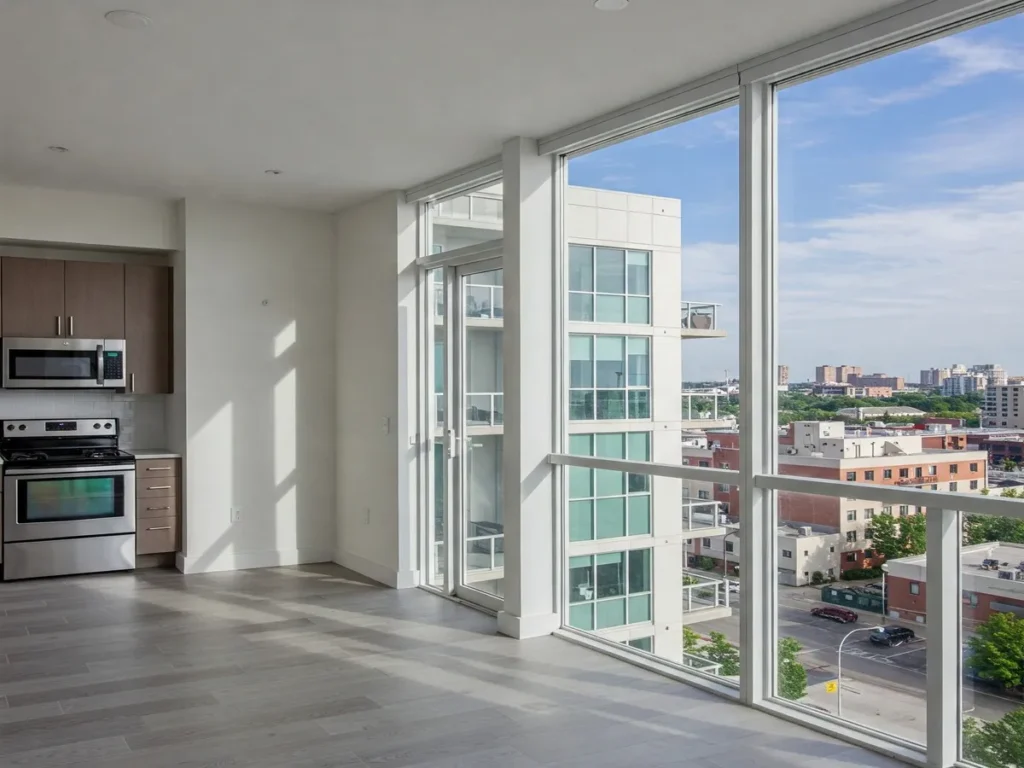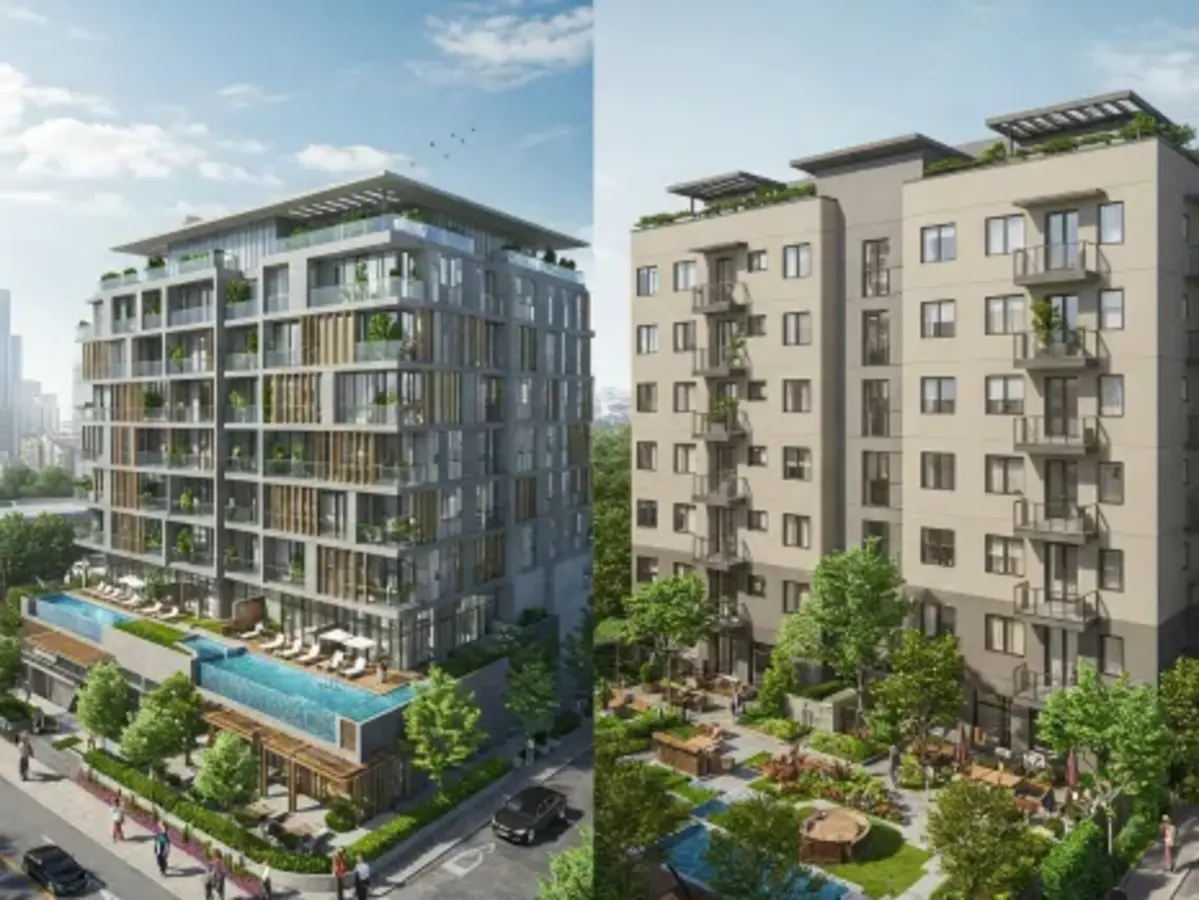When searching for a new place to live, the terms condo and apartment are often used interchangeably–But they represent two very different types of housing. whether you are a first time renter, a prospective buyer or simply exploring real estate options, understanding the differences between condos and apartments can save your time and money and potential headaches.
In this comprehensive guide, we’ll break down everything you need to know-ownership structures, costs, maintenance responsibilities, lifestyle implications, and investment potential–So you can make an informed decision. By the end, You’ll know exactly which option aligns with your financial goal and living preferences.
What Is a Condo? (And How Does It Differ from an Apartment?)
A condominium (condo) is a privately owned residential unit within a larger building or community. Unlike apartments, Which are typically owned by a single landlord or property management company. Condos are purchased by individuals who then have full ownership of their units.
Key Features of a Condo:

- Private Ownership –You own the unit and can modify it (within association rules).
- HOA Fees – Monthly fees cover shared amenities and maintenance.
- Community Rules – Condo associations enforce bylaws on noise, pets, and renovations.
- Investment Potential — Condos can appreciate in value , making them a long term asset.
Fix or Suggestion: If you crave customization and long term equity, a condo might be ideal—just budget for HoA fees and review association rules before buying.
What Is an Apartment? (The Renter’s Choice)
An apartment is a rental unit within a multi-family building owned by a landlord or property management company. Tenants pay monthly rent but don’t build equity.
Key Features of an Apartment:

- No Ownership – If you’re a tenant and not an owner, so you can’t make structural changes.
- Fixed Rent & Leases – Rent may increase annually, but the good thing is, The maintenance is handled by landlord.
- Fewer Upfront Costs – No down payment or property taxes, just security deposits.
- Flexibility – Easier to relocate without selling property.
Suggestion: if you prioritize flexibility and minimal responsibility, renting an apartment is the smarter short-term choice.
5 Major Differences Between Condos and Apartments
1. Ownership & Financial Commitment
The fundamental distinction between condos and apartments lies in ownership structure. With a condo, you become the legal owner of your unit, taking on financial responsibilities including a mortgage, property taxes and monthly hoa fees. This ownership means you’re building equity with each payment, Creating a potential long term asset. Apartments operate on a rental model where you pay monthly rent to a landlord or property management company, Without accumulating any ownership stake. While this means no equity buildup, its also eliminates the long term financial obligations and risks associated with property ownership.
Which is better? For those ready to invest in real estate and commit to a property, condos offer wealth building potential. if you prioritize flexibility and minimal financial ties, then renting an apartment provides greater freedom.
2. Maintenance & Repairs
Maintenance responsibilities create another key difference between these housing options. condo owners are typically responsible for all interior maintenance and repairs from appliances to living room flooring upgrades within their unit, from appliance breakdowns to plumbing issues, While the condo association handles exterior and common area maintenance through HOA fees. Apartments offer a completely hands– off approach -when something breaks or needs attention, you simply submit a maintenance request to the landlord oor property manager who is contractually obligated to address the issue.
Suggestion: If you enjoy home maintenance or want control over repair quality, condo ownership may suit you. if you’d rather avoid the hassle and expense of repairs altogether, apartment living provides peace of mind.
3. Customization & Rules
The ability to personalize your living space varies significantly between these options. Condo ownership grants you considerable freedom to renovate and customize your unit, incorporate features like Indoor Living Room Plants for a more personalized touch, though you wil need to comply with any HOA Guidelines regarding structural changes or aesthetic modifications. Apartment dwellers face much stricter limitations- most standard leases prohibit permanent alterations and even temporary changes like painting walls often require landlord approval.
Pro Tip: For those who view their home as a creative canvas, condos offer far greater personalization potential. Small upgrades like adding functional yet stylish rugs can manage rental spaces without breaking lease terms. if you prefer move-in ready spaces without renovation responsibilities, Then apartments better match this preference.
4. Amenities & Community Living
Both condos and apartments frequently offer appealing amenities like swimming pools, fitness centers, and security systems, but the community living experience differs. Condo communities often enforce more stringent rules regarding noise levels, guest policies, and shared space usage, as residents have a vested interest in maintaining property values. Apartment complexes typically provide more responsive on-site management for immediate issue resolution, though rules may be less strictly enforced in some cases .
Suggestion: If you value orderly community standards and don’t mind stricter regulations condo living may appeal to you. those who prioritize convenience and quick problem resolutions might prefer the apartment lifestyle.
5. Cost Comparison: Upfront & Long-Term
| Expense | Condo | Apartment |
| Upfront Cost | Down payment +closing costs | Security deposit + first month’s rent |
| Monthly Cost | Mortgage + HOA fees | Rent + utilities |
| Long-Term Value | Builds equity | No investment return |
Which is cheaper short-term? Apartments. Long term? Condos can be a wealth-building tool.
Pros & Cons of Condos vs. Apartments
Pros of a Condo
1. Equity Building – You own an asset that may appreciate.
2. Customization freedom – Renovate per your taste (within HOA rules.
3. Community Perks – access to shared amenities (pools, gyms security).
Cons of a Condo
1. HOA Fees and Rules– Monthly fees and strict regulations.
2. Resale Challenges– Market fluctuations affect value.
Pros of an Apartment
1. No Long Term Commitment – Lease flexibility.
2. Maintenance-Free Living – Repairs are the landlord’s responsibility.
3. Lower Upfront Costs – No down payment or property taxes.
Cons of an Apartment
1. No Ownership – Rent money doesn’’t build equity.
2. Rent Increases – Landlords can raise prices annually.
Which Should You Choose? (Decision-Making Part)

Choose a Condo If You….
- Plan to stay long term and want investment.
- Desire customization and ownership perks.
- can afford mortgage payments + HOA fees.
Choose an Apartment If You….
- Prefer flexibility (job changes and relocations).
- Don’t want maintenance responsibilities.
- Aren’t ready for a down payment.
Suggestion: Assess your financial readiness, lifestyle needs, and future plans before deciding. If you are in doubt, Rent first—Then consider buying once you’re certain of your long-term goals.
Final Thoughts: Making the Right Choice for Your Lifestyle

Whether you choose a condo or apartment depend on your financial situation, desired level of responsibility and long term goals. Condos offer ownership and investment potential, while apartments provide flexibility and ease.
FAQs About Condos vs. Apartments
Q. Can you rent a condo?
Yes, Some condo owners lease their units, but rules vary by HOA.
Q. Do condos appreciate like houses?
They can, but slower than single-family homes due to HOA restrictions.
Q. Are apartments safer than condos?
Both can be secure–check for gated access, security cameras, and neighborhood crime rates
Q. Can I negotiate condo HOA fees?
No, fees are set by the association , But review what they cover (some include utilities.
Q. What is an HOA, what are HOA fees, and what benefits do they provide?
A Homeowners Association (HOA) is a governing body in a residential community that enforces rules and maintains shared spaces. Residents pay HOA fees typically ranging from $100 to $1000 per month-to fund services like landscaping, security , trash removal and amenities such as pools or gyms. these fees help preserve property values and ensure neighborhood upkeep.
A Reddit post highlights a condo in Florida where the HOA fee is $1,600 per month.
Q. Can an HOA enter your home, and are there unenforceable HOA rules?
HOAs generally cannot enter your private residence without permission, except in emergencies or if authorized by the community’s governing documents. Some HOA rules may be unenforceable if they violate federal or state laws, lack proper authority, were enacted improperly, or are enforced inconsistently. Examples include restrictions that infringe on free speech, religious expression, or fair housing rights. Learn More→
Q. Are HOA fees tax-deductible, and how much HOA fee is too high?
HOA fees are usually not tax-deductible for primary homes, but they can be deducted if the property is a rental.
Fees may be too high if they exceed 1–1.5% of the property’s value annually or don ‘t match the amenities offered.






[…] between Yoga and Pilates is kind of like choosing between a condo and an apartment—both have their strengths, it just depends on your […]